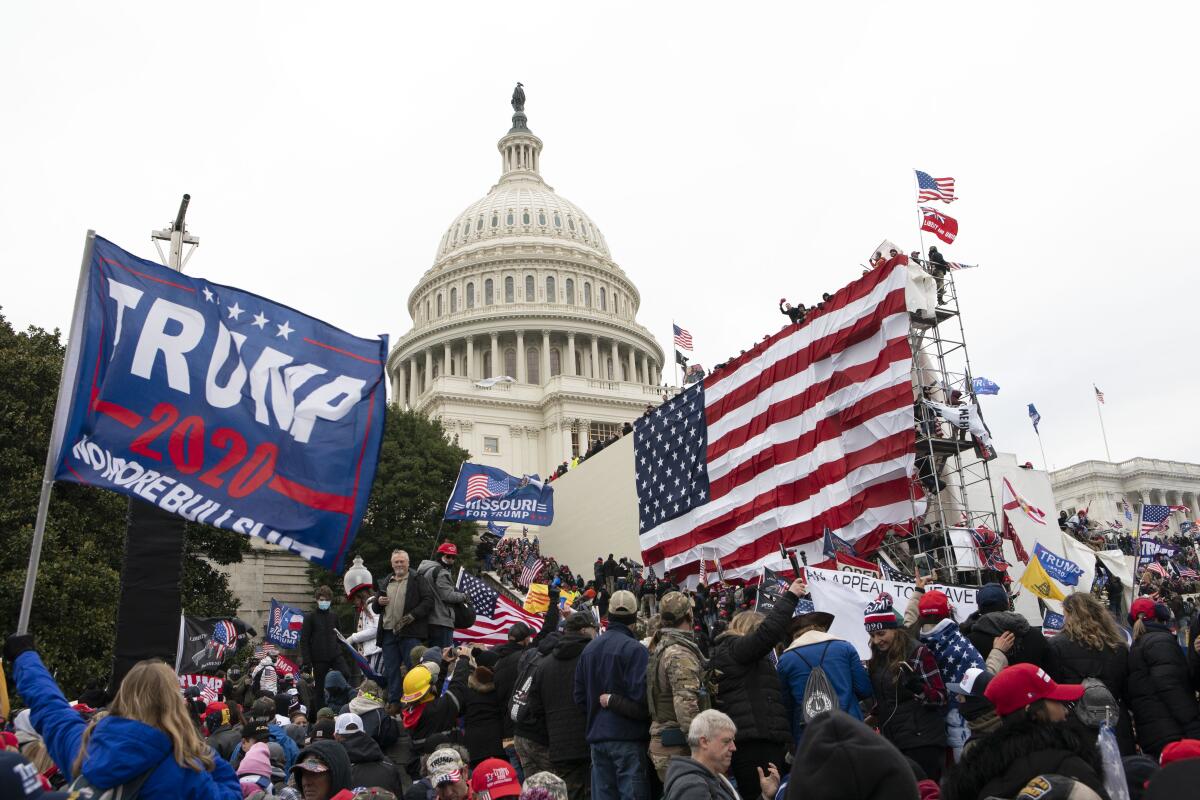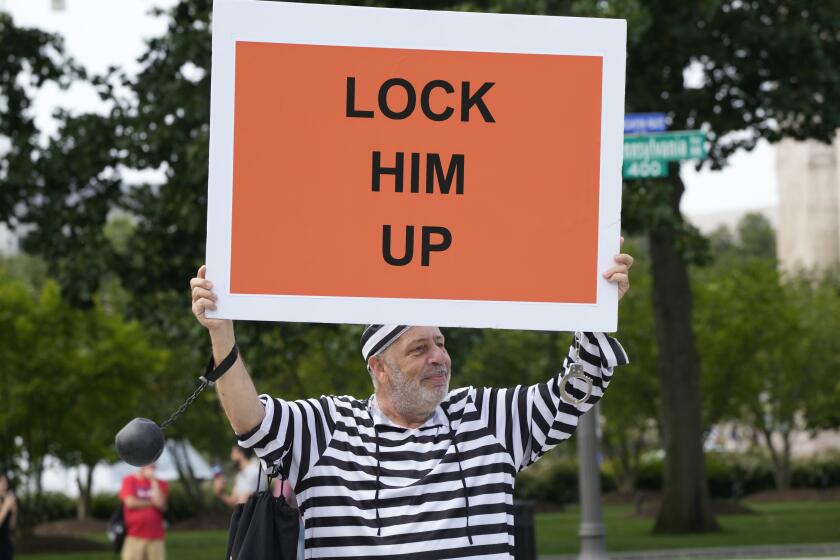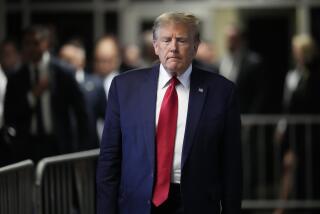Will Trump ever be tried for Jan. 6? Here’s the answer that emerged from the latest hearing

- Share via
Much remained uncertain after Thursday’s hearing on how to proceed with the federal Jan. 6 case against Donald Trump following the Supreme Court’s immunity ruling. But one point seemed clear: It’s not going to trial anytime soon.
The parties and U.S. District Judge Tanya Chutkan agreed that, as the judge put it, “the issue of immunity will stop these proceedings once again.”
The judge’s forlorn prediction is a safe one given the Supreme Court’s Delphic opinion and the Justice Department’s subsequent superseding indictment in the case.
The vice president and longtime California prosecutor had a carefully institutionalist answer to Democrats chanting for her opponent’s incarceration.
The new indictment, filed by special counsel Jack Smith last week, excises much of the evidence that the Supreme Court barred from being raised because it relates to conduct that enjoys absolute immunity. In particular, it deletes an entire chapter involving Trump’s effort to get the Department of Justice to falsely tell Georgia officials that it had detected fraud in the state’s vote, which Joe Biden won narrowly. The superseding indictment also omits evidence involving Trump’s discussions with the staff of the White House counsel’s office.
Smith’s team recast the indictment as a narrative about Trump the candidate — a private citizen not draped in any official authority. But the government opted to retain some crucial evidence from Trump’s interactions with subordinates, namely his vicious browbeating of Vice President Mike Pence in an effort to get him to block electoral votes for Biden on Jan. 6, 2021. The special counsel must have concluded that the evidence was so important that he was ready to accept the risk and delay that come with further Supreme Court review.
The judge’s dismissal of the classified records case against Donald Trump has much more to do with Project 2025-style partisan politics than it does with the Constitution.
The justices’ opinion clearly regards discussions between the president and vice president as “presumptively immune.” Smith can overcome that presumption by showing that such evidence would not infringe, in the court’s words, “on the authority and functions of the executive branch.”
What that means in practical terms is anybody’s guess. So is the critical question of burden of proof — whether Smith must show the case won’t intrude on executive authority by a preponderance of the evidence, for example, or beyond a reasonable doubt. The court doesn’t say, leaving those questions for Chutkan to answer, with a high risk of reversal if she guesses wrong. Trump lawyer John Lauro’s sardonic aside that the court’s direction was “clear” provoked laughter in the courtroom.
The Justice Department is presumably relying on a hint dropped in the immunity opinion by Chief Justice John G. Roberts Jr. as to whether interactions between Trump and Pence concern the “authority and functions of the executive branch.” Roberts noted Pence’s dual constitutional role as both an executive official and the Senate president. Pence presided over a joint session of Congress to certify the election on Jan. 6, 2021, acting in a legislative rather than executive capacity.
But the court’s hint was far short of an assurance. The most damning conversations between Trump and Pence took place in the Oval Office before the congressional proceeding. Smith will have to argue that scrutinizing those nasty tête-à-têtes would not infringe on executive authority.
Even if Chutkan agrees, the question will likely necessitate a trip back to the U.S. Court of Appeals for the D.C. Circuit as well as the Supreme Court. Lauro, for his part, made it clear that Trump’s team will argue that the presentation of evidence of the Pence-Trump discussions to the latest grand jury requires dismissal of the charges under the Supreme Court’s opinion.
Given that the Pence evidence is just the first of many headaches the justices bequeathed to Chutkan, the government argued that the district judge should decide all the immunity questions first. That would mean just one more appellate interruption in the case rather than a series of trips through the federal courts to decide separate immunity issues.
Lauro argued that Chutkan should first resolve basic objections to the superseding indictment, including a new defense argument picking up on U.S. District Judge Aileen Cannon’s dismissal of the classified documents case. Chutkan responded that she didn’t find Cannon’s ruling that the special counsel was improperly appointed “particularly persuasive” — an understatement of the consensus that it was wildly off base.
Chutkan seemed unlikely to accept Trump’s invitation to handle other arguments first, saying, “Immunity is the linchpin here.” She also rejected Lauro’s argument that the superseding indictment amounts to a completely new case, saying, “It’s not more stuff, it’s less.”
Lauro eventually acknowledged Trump’s political motivations, arguing that the immunity issue shouldn’t be considered at this “sensitive time” — that is, before the election. “We are talking about the presidency of the United States,” Trump’s attorney protested
Chutkan had a ready response: “I’m not talking about the presidency. I’m talking about a four-count indictment.”
In an order later Thursday, the judge set deadlines for filings on immunity and other issues through the end of October, largely rejecting the defense’s efforts to slow the case further. That will bring the pretrial proceedings to the eve of the election.
Chutkan’s frustration was evident when she ended the hearing by noting that it “would be an exercise in futility” to set a new trial date only to be interrupted by further appeals.
The upshot for what was once the most important and likely attempt to bring Trump to justice is discouraging. Thanks to the nation’s highest court, a trial many observers hoped to see unfold before the election is not likely to happen until 2026 or later — if it takes place at all.
Harry Litman is the host of the “Talking Feds” podcast and the “Talking San Diego” speaker series. @harrylitman
More to Read
A cure for the common opinion
Get thought-provoking perspectives with our weekly newsletter.
You may occasionally receive promotional content from the Los Angeles Times.









